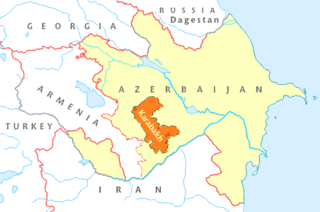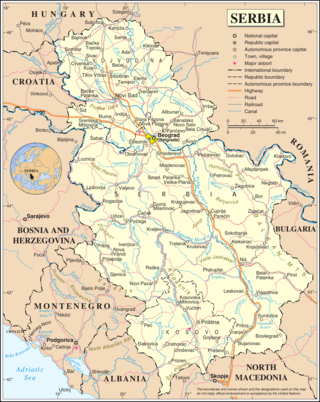
The United Nations Security Council (UNSC) is one of the six principal organs of the United Nations (UN) and is charged with ensuring international peace and security, recommending the admission of new UN members to the General Assembly, and approving any changes to the UN Charter. Its powers as outlined in the United Nations Charter include establishing peacekeeping operations, enacting international sanctions, and authorizing military action. The UNSC is the only UN body with the authority to issue binding resolutions on member states.

The member states of the United Nations comprise 193 sovereign states. The United Nations (UN) is the world's largest intergovernmental organization. All members have equal representation in the UN General Assembly.

United Nations Security Council Resolution 242 (S/RES/242) was adopted unanimously by the UN Security Council on November 22, 1967, in the aftermath of the Six-Day War. It was adopted under Chapter VI of the UN Charter. The resolution was sponsored by British ambassador Lord Caradon and was one of five drafts under consideration.
A United Nations General Assembly resolution is a decision or declaration voted on by all member states of the United Nations in the General Assembly.

The Shebaa Farms, also spelled Sheba'a Farms, is a small strip of land at the intersection of the Lebanese-Syrian border and the Israeli-occupied Golan Heights. The territory is named for the farms within it which were historically tended by the inhabitants of the Lebanese town of Shebaa. It is about 11 kilometres (7 mi) long and 2.5 kilometres (2 mi) wide.

The Blue Line is a demarcation line between Lebanon and Israel and Lebanon and the Golan Heights published by the United Nations on 7 June 2000 for the purposes of determining whether Israel had fully withdrawn from Lebanon. It has been described as: "temporary" and "not a border, but a “line of withdrawal”.

The United Nations Disengagement Observer Force (UNDOF) is a United Nations peacekeeping mission tasked with maintaining the ceasefire between Israel and Syria in the aftermath of the 1973 Yom Kippur War. The mission was established by United Nations Security Council Resolution 350 on 31 May 1974, to implement Resolution 338 (1973) which called for an immediate ceasefire and implementation of United Nations Security Council Resolution 242.

United Nations Security Council Resolution 1680, adopted on May 17, 2006, after recalling previous resolutions on Lebanon, including 425 (1978), 426 (1978), 520 (1982), 1559 (2004) and 1655 (2005), the Council strongly encouraged Syria to respond positively to Lebanon's request to delineate borders and establish diplomatic relations, with the purpose of asserting Lebanon's sovereignty, territorial integrity and political independence.

United Nations Security Council resolution 874, adopted unanimously on 14 October 1993, reaffirmed sovereignty and territorial integrity of the Azerbaijani Republic and of all other States in the region, called for the preservation of the ceasefire, cessation of hostilities and withdrawal of forces from recently occupied districts of the Republic of Azerbaijan, and reaffirmed resolutions 822 (1993) and 853 (1993). The Council expressed its concern at "...the conflict in and around the Nagorny Karabakh region of the Azerbaijani Republic, and of the tensions between the Republic of Armenia and the Azerbaijani Republic...", and called upon the parties to observe the ceasefire agreed with by the government of Russia and OSCE Minsk Group.

United Nations Security Council resolution 970, adopted on 12 January 1995, after reaffirming all resolutions on the situation in Bosnia and Herzegovina in particular Resolution 943 (1994) concerning the border closure between the Federal Republic of Yugoslavia and Bosnia and Herzegovina, the Council decided that measures in that resolution would be suspended for a further period of 100 days.

United Nations Security Council resolution 1454, adopted on 30 December 2002, after recalling all previous resolutions on Iraq, including resolutions 661 (1991), 986 (1995), 1284 (1999), 1352 (2001), 1360 (2001), 1382 (2001), 1409 (2002) and 1447 (2002) concerning the Oil-for-Food Programme, the council adjusted the list of restricted goods and procedures for its implementation under the Oil-for-Food Programme. It was the final Security Council resolution adopted in 2002.

United Nations Security Council Resolution 1994, adopted unanimously on 30 June 2011, after considering a report by the Secretary-General Ban Ki-moon regarding the United Nations Disengagement Observer Force (UNDOF), the Council extended its mandate for a further six months until 31 December 2011.

Humanitarian aid during the Syrian civil war has been provided by various international bodies, organizations and states. The main effort is coordinated by Jonh Ging of the United Nations Office for the Coordination of Humanitarian Affairs (UNOCHA). In 2014, U.N. Security Council Resolution 2165 authorised humanitarian aid to be supplied via four border crossings not controlled by the Syrian government, generally to supply rebel-controlled territory.
United Nations Security Council Resolution 2139 was passed by a unanimous vote of the Council on February 22, 2014, and calls on all parties in the Syrian Civil War to permit free access to humanitarian aid.

The United Nations Security Council Resolution 2254 was unanimously adopted on 18 December 2015. It calls for a ceasefire and political settlement in Syria. This document describe the roadmap for Syria's political transition. As of 2023, no real progress has been made to implement the resolution.
United Nations General Assembly Resolution 48/144 of 20 December 1993 is a resolution in which the General Assembly expressed its concern at the ongoing degradation of the humanitarian situation in Azerbaijan because of the displacement of considerable number of citizens due to Nagorno Karabakh conflict and supporting "emergency international assistance to refugees and displaced persons in Azerbaijan". The resolution is titled “48/114. Emergency international assistance to refugees and displaced persons in Azerbaijan”. It became the fifth United Nations document concerning Nagorno-Karabakh and the first United Nations General Assembly document on humanitarian aid to those affected by this conflict. This resolution was the first international document affirming the number of refugees and displaced persons in Azerbaijan exceeded one million. The document does not make any specific reference to previous UN resolutions on the ongoing conflict, but "its relevant resolutions regarding humanitarian assistance to refugees and displaced persons". The resolution was adopted by consensus without voting.

The eleventh emergency special session of the United Nations General Assembly opened on 28 February 2022 at the United Nations headquarters. It addresses the Russian invasion of Ukraine. Maldivian politician Abdulla Shahid served as President of the body during this time.
United Nations Security Council Resolution 2165 was passed by a unanimous vote on 14 July 2014, and allows direct humanitarian access across four border crossings not controlled by the Syrian government.
United Nations Security Council Resolution 2585 was passed by a unanimous vote on 9 July 2021, which allowed UN agencies to continue to coordinate and deliver aid cross-border from Turkey to northwestern Syria without Syrian government consent. Russia had threatened to veto renewal of the mandate to allow cross-border aid, but agreed to a compromise the day before the mandate was set to expire on 10 July 2021.
United Nations Security Council Resolution 2533 was passed by a unanimous vote and adopted on 11 July 2020.












